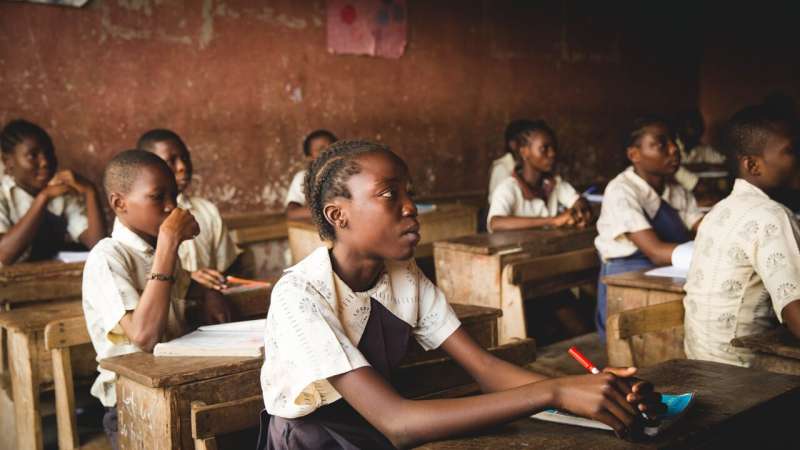This article has been reviewed according to Science X's editorial process and policies. Editors have highlighted the following attributes while ensuring the content's credibility:
fact-checked
peer-reviewed publication
trusted source
proofread
A new law regarding compulsory education in Nigeria paves way for worldwide cancer prevention strategy

The findings of Griffith University research influenced the passing of a bill in Nigeria leading to a new law to ensure high school students receive compulsory education about breast, cervical and prostate cancers.
As of 23 May 2023, the entire country of Nigeria will incorporate the new teachings into the compulsory Civic Education subject at the senior high school level to promote awareness and prevention of these cancers.
Griffith School of Medicine and Dentistry Associate Professor Chris Ifediora said targeting high school students with enlightenment interventions is the most effective pathway toward prevention.
"Our research revealed that maintained engagement can help, to not only reduce the poor outcomes from these cancers, but also to debunk damaging myths associated with them," Dr. Ifediora said.
"Cervical and breast cancers occur disproportionately in lower to middle-income countries (LMICs) where economies have limited resources.
"Our research offers an important approach that can be affordable, cost-effective, culturally acceptable, and sustainable."
Co-researcher and Griffith School of Medicine and Dentistry Professor Lennert Veerman said the new law is likely to save many lives annually in Nigeria, a country of about 221 million people.
"The initiative can be adapted to reach all other LMICs that face similar cancer burdens," Professor Veerman said.
Though Australia has relatively strong outcomes in breast and cervical cancers, uptake of screening has shown to stall to only 55%–57% uptake and even worse in Aboriginal communities where uptake for cervical cancer screening is at 34%.
Dr. Ifediora said the success of this bill models a pathway toward closing the gap in Australia.
"Indigenous Australians with cervical cancer have a 5-year survival chance of 56%, as against the 72% chance for their non-Indigenous counterparts, and these disparities are largely linked to lower cervical cancer screening rates," Dr. Ifediora said.
"Targeting high school students means targeting the adults, parents, leaders, and policymakers of tomorrow.
"Evidence shows increased awareness is linked to improved positive attitudes, uptake in screenings and vaccinations, and will help address some of the lingering hesitancy behind the poor uptakes, particularly among Indigenous communities."
"I believe this solution offers a realistic and sustainable pathway to a desired global elimination of cervical cancer and Australia could lead the way for other developed countries.
The new bill is cited as the "Mandatory Inclusion of Teachings on Breast, Cervical, and Prostate Cancers into the curriculum of Senior Secondary Schools and Colleges of Education in Nigeria Bill, 2023" and will ensure teachers receive adequate training in the subject across Nigeria.
Associate Professor Ifediora is the founder of the Onyebuchi Chris Ifediora (OCI) Foundation, a registered Australian charity organization, and works to create a better society through education, health and empowerment activities in Nigeria, West Africa.
Dr. Ifediora said the OCI Foundation intends to work with the Nigerian Government to implement the new law, and Griffith University made a significant research contribution to the passing of this bill.
"We hope Griffith will continue to play a role in the implementation phase, particularly as the program will get pushed through to the African Union and the entire African continent," Dr. Ifediora said.
Articles by Griffith University researchers influencing this outcome were published in BMC Public Health and the Journal of Evaluation in Clinical Practice.
More information: Christian Ifediora et al, Outcomes from integrating anti-cervical cancer teachings into the curriculum of high schools in a South-Eastern Nigerian State, BMC Public Health (2022). DOI: 10.1186/s12889-022-14231-4
Chris Onyebuchi Ifediora, Re-thinking breast and cervical cancer preventive campaigns in developing countries: the case for interventions at high schools, BMC Public Health (2019). DOI: 10.1186/s12889-019-6890-2
Chris O. Ifediora et al, Sustainable and cost‐effective teenage breast awareness campaigns: Insights from a Nigerian high school intervention study, Journal of Evaluation in Clinical Practice (2019). DOI: 10.1111/jep.13101




















